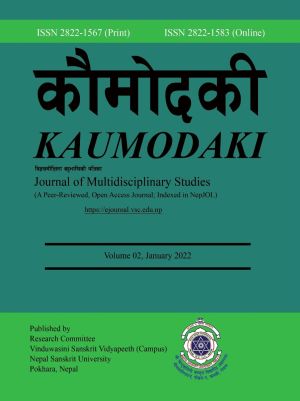Femaleness in Shobha De’s Sisters
DOI:
https://doi.org/10.3126/kdk.v2i1.42878Keywords:
Cesspool, femaleness, femininity, patriarchal hegemony, subjugationAbstract
The objective of this article is to explore the female voice in Shobha De’s novel Sisters. The main female characters Mikki and Alisha discard the gender roles prescribed by the patriarchal society. In course of their struggle against the subjugation, they realize that the attributes of femininity are simply the trappings of male chauvinism. They speak that the be-all and end-all of a female is to realize the biological aspect of femaleness. Their dialogues and actions clarify that they want to disseminate the doctrines that sex and gender differ from each other. Sex is natural and biological while the gender is constructed by social and cultural patterns. The novel exposes this dichotomy between nature and nurture. Mikki readily leaves her home and rebels against the domination of her husband and determines to hear the inner voice of female. Alisha, on the other hand, believes that one can gain power by controlling the economic status. They both unite to come out of cesspool of patriarchal hegemony. In this regard, they become the revolutionary angels for the women. They become new women. The article exploits the paradigm of qualitative approach by using the perspective of feminism to explore all these dynamics of femininity and femaleness in the novel. It provides the points of departure between the femininity and femaleness by analyzing the issues in the novel.
Downloads
Downloads
Published
How to Cite
Issue
Section
License
This license enables reusers to distribute, remix, adapt, and build upon the material in any medium or format for noncommercial purposes only, and only so long as attribution is given to the creator.




